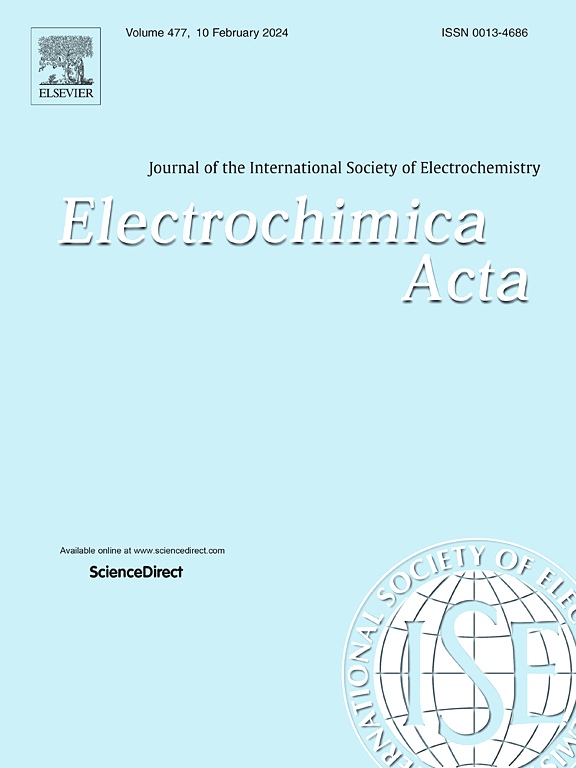基于自适应强跟踪算法和施密特正交变换的钠离子电池荷电状态和健康状态估计双卡尔曼滤波算法
IF 5.5
3区 材料科学
Q1 ELECTROCHEMISTRY
引用次数: 0
摘要
近年来,钠离子电池因其结构简单、可扩展性强、成本效益高等优点,成为一种极具发展前景的储能技术。准确估计充电状态(SOC)和健康状态(SOH)对于优化电池管理和确保运行可靠性至关重要。基于分数阶模型的自适应强跟踪算法和施密特正交变换的双卡尔曼滤波算法(ASTSOUKF-EKF),提出了SIB中SOC和SOH的联合估计框架。通过鲸鱼优化算法获取各参数的初始值并进行建模,证明分数阶模型能有效捕获sib的复杂离子动力学,最大建模误差小于0.0707 V。为了解决电压灵敏度限制和实时状态跟踪的挑战,我们将改进的自适应强跟踪滤波器(ASTF)与Unscented卡尔曼滤波器(UKF)相结合,利用先验残差和后验残差之间的关系,利用自适应算法重新确定衰落因子的值,从而提高SOC估计的精度和动态响应。施密特正交变换(SOT)进一步简化了采样点选择的计算过程,而扩展卡尔曼滤波(EKF)可以实现鲁棒的在线参数识别,以实现精确的SOH监测。不同健康状态下的实验验证表明,该算法性能优越,平均SOC误差<;0.4%, SOH精度在1%以内,最大平均误差为0.58%。这项工作为sib的先进电池管理奠定了方法论基础,弥合了下一代储能系统理论建模和实际实施之间的关键差距。本文章由计算机程序翻译,如有差异,请以英文原文为准。
A dual Kalman filtering algorithm for estimating the state of charge and health of sodium-ion batteries based on adaptive strong tracking algorithm and schmidt orthogonal transformation
Sodium-ion batteries (SIBs) have emerged as a promising energy storage technology due to their simple structure, scalability, and cost-effectiveness, garnering significant attention in recent years. Accurate estimation of the state of charge (SOC) and state of health (SOH) is critical for optimizing battery management and ensuring operational reliability. This study proposes a new joint estimation framework for SOC and SOH in SIB, based on the adaptive strong tracking algorithm of the fractional-order model and the double Kalman filtering algorithm of schmidt orthogonal transformation (ASTSOUKF-EKF). By obtaining the initial values of each parameter through the whale optimization algorithm and conducting modeling, it is proved that the fractional-order model effectively captures the complex ion dynamics of SIBs, and the maximum modeling error is less than 0.0707 V. To address the challenges of voltage sensitivity limitations and real-time state tracking, we integrate the improved adaptive strong Tracking Filter (ASTF) with the Unscented Kalman Filter (UKF), and utilize an adaptive algorithm to re-determine the value of the fading factor by using the relationship between prior residuals and posterior residuals, thereby enhancing the SOC estimation accuracy and dynamic response. Schmidt orthogonal transformation (SOT) is further incorporated to streamline computational processes during sampling point selection, while the extended Kalman filter (EKF) enables robust online parameter identification for accurate SOH monitoring. Experimental validation under diverse health states demonstrates the algorithm's superior performance, achieving an average SOC error <0.4% and SOH accuracy within 1%, with maximum average errors of 0.58%. This work establishes a methodological foundation for advanced battery management in SIBs, bridging critical gaps between theoretical modeling and practical implementation for next-generation energy storage systems.
求助全文
通过发布文献求助,成功后即可免费获取论文全文。
去求助
来源期刊

Electrochimica Acta
工程技术-电化学
CiteScore
11.30
自引率
6.10%
发文量
1634
审稿时长
41 days
期刊介绍:
Electrochimica Acta is an international journal. It is intended for the publication of both original work and reviews in the field of electrochemistry. Electrochemistry should be interpreted to mean any of the research fields covered by the Divisions of the International Society of Electrochemistry listed below, as well as emerging scientific domains covered by ISE New Topics Committee.
 求助内容:
求助内容: 应助结果提醒方式:
应助结果提醒方式:


